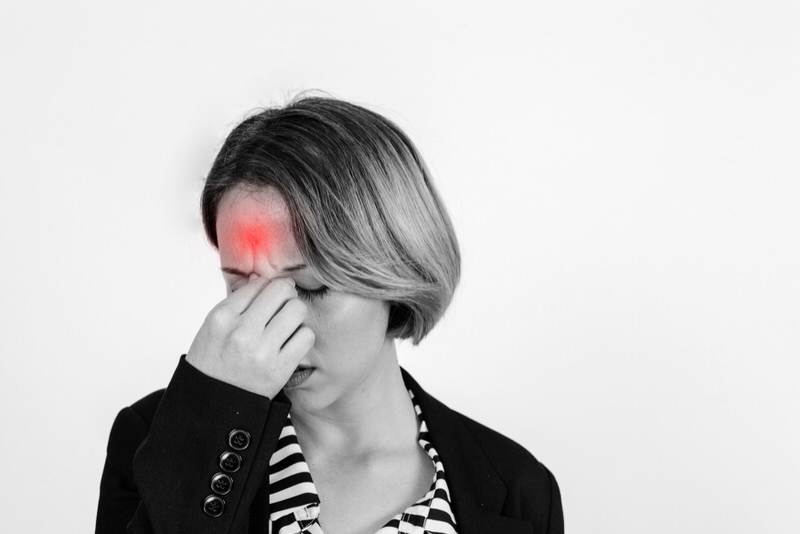Stress and anxiety can indirectly cause nasal problems like sinusitis. Anxiety is a condition that can mainly affect your immune system, hormones, and your neurotransmitters. Suppose you have nasal problems due to stress. In that case, it can be related to a tic, meaning that you might be habituated to rub or pinch your nose whenever you’re stressed, which can sometimes lead to infections causing nasal congestion, sneezing, and pressure in the bridge of the nose and such.
There is no definite cure for stress-caused nasal problems. The one thing you can do that will work too is to control your anxiety and stress. You can do many things to help reduce your stress, like taking a long hot shower/bath, going for a jog, meditating every day, doing anxiety exercises.
The hustle and bustle of modern-day living can be very strenuous and anxious for us. At the same time, we agree that we no longer live in the World War era where we don’t know what tomorrow brings for us. But we can’t also deny that today while running behind achieving our dreams and ambitions, we take up too much stress and anxiety in our daily lives.
Although everyone you know is stressed nowadays, stress affects everyone differently. We are all aware that too much stress can cause high blood pressure, headaches, or nausea.
Still, very few of us with nasal issues realize the link between anxiety and our nasal problems, and that part of the illness is caused by the extreme stress and anxiety we’re feeling every day.
How do anxiety and stress cause nasal problems?

Anxiety and stress can indirectly affect your mood and physically affect you by increasing your susceptibility to various health issues.
Being under constant stress and feeling anxious can weaken your immune system in the long run. Go to any doctor, and they’ll advise you to take it easy, rest well, and not overthink too much.
Constant stress can make you more vulnerable to the effects of allergens, germs, infections, viruses, and bacteria. The standard explanation why sometimes too much stress causes nasal problems is that stress-related infections destroy your nose’s cilia.
The cilia move back and forth to move the mucus out of the sinuses and back of the nose. It protects from any invasion of foreign particles and harmful bacteria entering the sinus through the nose.
When there’s an infection, the cilia are destroyed, which in turn creates a passage for bacteria and germs to move in freely and grow, which later causes nasal congestion.
On top of this, when your immune system is already down due to the infection, more stress in your life can become a burden on the already existing sinus pain, making your body more prone to other illnesses.
Nasal tics when stressed
It’s a human tendency to have a particular tic when feeling incredibly anxious.
Some people develop a tic when they’re stressed, like rubbing their nose, squeezing it as a response to stress, or scratching their head. When the person rubs their nose hard or squeezes it as a response to stress can cause nasal pain, which can even trigger severe sneezing and runny nose or nasal congestion.
Many people might touch their face more often when stressed, and that can be a primary reason for having acne on their faces or around the nose because the dirt and bacteria have entered from their hands and into the pores on their faces.
What are the nasal symptoms caused by anxiety?
Too much stress can affect your overall mental and physical health. You might no longer be able to focus on a particular thing at a time. Your mind will always be fleeting, calculating and analyzing things.
You might not any longer enjoy any good moments even when you’re present there. These are some of the common issues you face mentally while under stress.
But with physical symptoms, it sometimes becomes hard to tell or differentiate the symptoms, whether it’s stress-related or due to allergies or cold.
Having said that, there are several ways that constant stress and anxiety affect the nose, like:
Nosebleeds
You might’ve experienced or heard from somebody that their nose starts bleeding every time they feel very stressed. What happens is that sometimes anxiety causes temporary spikes in your blood pressure, and these spikes can cause damage to blood vessels which leads to bleeding.
I have an uncle who gets a nosebleed each time they’re under severe anxiety or stress, and the irony is that nosebleeds are known to cause more stress, leading to this vicious cycle of nosebleeds.
Tingling nose
While this symptom is not very common among people, a tingling feeling in the nose is sometimes associated with panic attacks because of hyperventilation.
A tingling nose may be a sign that you’re breathing poorly while indicating your brain to bring your breathing in control to reduce your stress level.
Nasal congestion
Sometimes, people under severe stress start sneezing too much, or their nasal passage gets inflamed, which creates nasal congestion or a clog.
Runny nose
Anxiety is also known to cause a runny nose. What’s the cause behind this? No one knows yet, but this is known that stress affects a person’s immune system, and so during this time, your allergies can worsen, and you can experience a runny nose. This can also lead to a cold.
The symptoms mentioned above are not the only ones, but some of the common symptoms people under stress have experienced. But some people experience pain in the nose, or their nose becomes pretty itchy due to anxiety.
No one can say for sure how anxiety will affect your body; only time will tell. But it is for sure that not everyone experiences the same symptoms, and not everyone experiences any symptoms.
How to deal with stress-related nasal problems?
You cannot know for sure whether your sinusitis or any other nasal problems is triggered due to stress; it could be an allergy or even a cold. But if you do feel that you’re stressed at a particular period, try your best to bring your anxiety and stress in control.
Try meditating

If you haven’t tried meditating yet, it’s high time that you do. Meditation has proven beneficial to so many people dealing with constant stress. There are so many apps on your device that can help and guide you to meditate.
Take 10 minutes out every day to meditate, and you’ll surely notice the difference once you start meditating every day.
Anxiety exercises
You can talk to a professional or look up online, and you’ll find so many exercises that you can perform the moment you start feeling anxious, from counting backward to naming 5 things you notice around you.
These exercises help you take your mind off the thing that triggered your anxiety and help you bring back your focus and look at the situation objectively.
Go for a jog
Jogging releases endorphins to help clear your mind and reduce your level of anxiety. Keep in mind that jogging might temporarily increase your symptoms of nasal troubles because jogging warms up the body, which can help create mucus.
Keep nasal spray handy
Indeed, prevention is better than cure, and you should do everything in your power to keep your stress in check, but what if your nasal problems are already triggered because of stress. In such cases, it’s better to keep your nasal spray with you because you never know when you’ll need it.
When a sinus infection is at its beginning stage, a saline nasal spray can give relief to your discomfort.
FAQs
What physical problems can anxiety cause?
Anxiety can affect your body physically by causing headaches, stomach pain, a spike in your blood pressure, rapid breathing or shortness of breath, fatigue, sweating, or insomnia.
How can I unblock my nose naturally?
You can take regular steams or keep a humidifier in your room. Keep your head elevated, stay hydrated, use a saline spray if needed and rest well.
Can depression cause sinus problems?
Depression is known to alleviate sinus-related problems. People with chronic sinusitis and who are depressed complain of more sinus pain than people who are not depressed.
How do you tell if your sinuses are inflamed?
You’ll experience symptoms like nasal inflammation, drainage down the back of the throat, blocked or stuffy nose, continuous thick discharge from the nose, and pain and tenderness around your eyes, nose, and forehead.
Takeaway
There are no special treatments or one-step-fix solutions for anxiety-related nasal problems, but there are a few tricks and home remedies you can do to keep your stress in control.
Try talking to a professional or speaking to a friend to help relieve your mental stress because if you’re under constant stress or pressure, it may lead to a runny nose, a nosebleed, or an itch.
Stress and anxiety can do many things to your body, some people get pain in their legs when their anxiety is elevated. Remember to take one step at a time, rest well, eat healthily and meditate every day.


